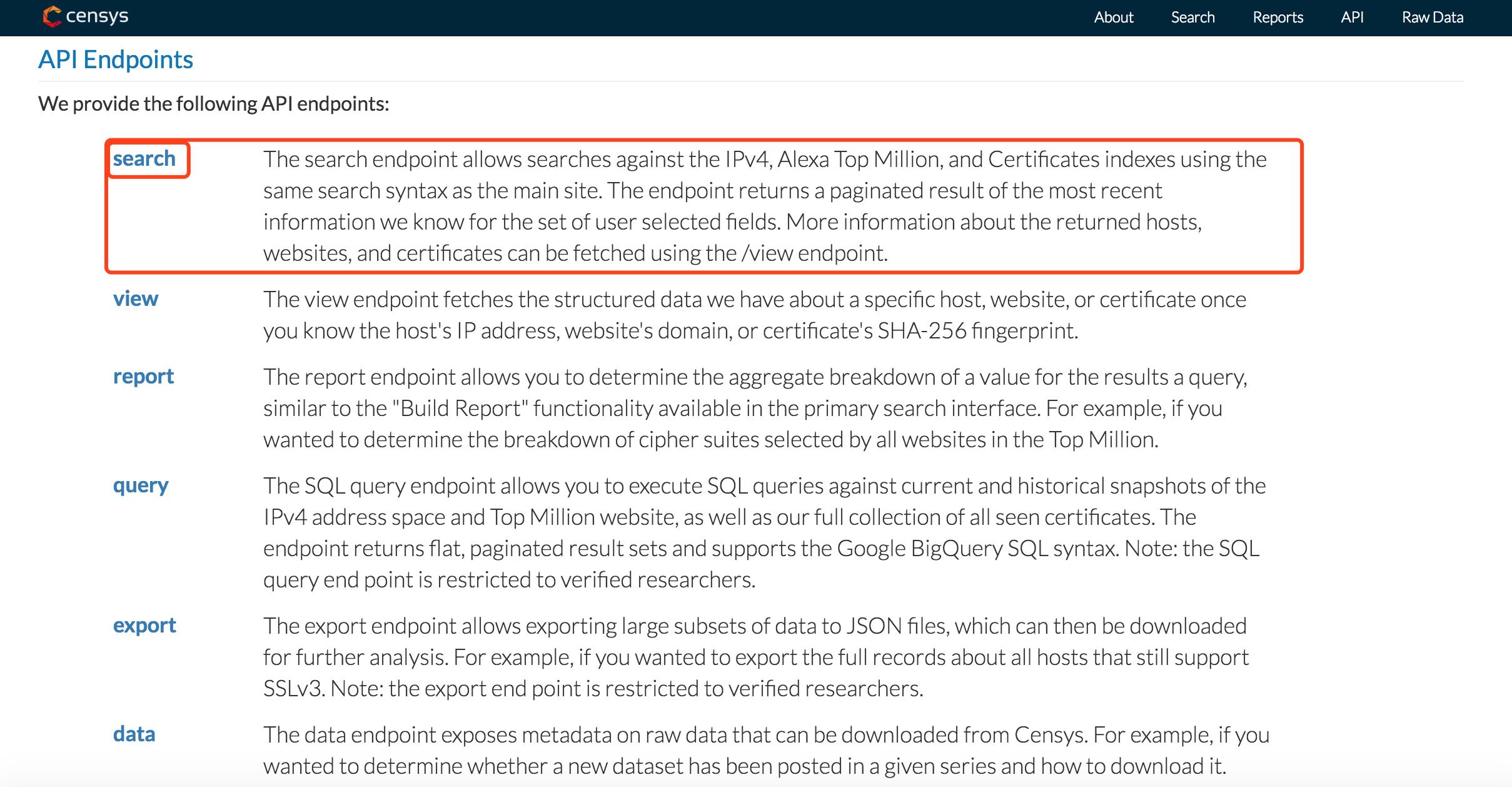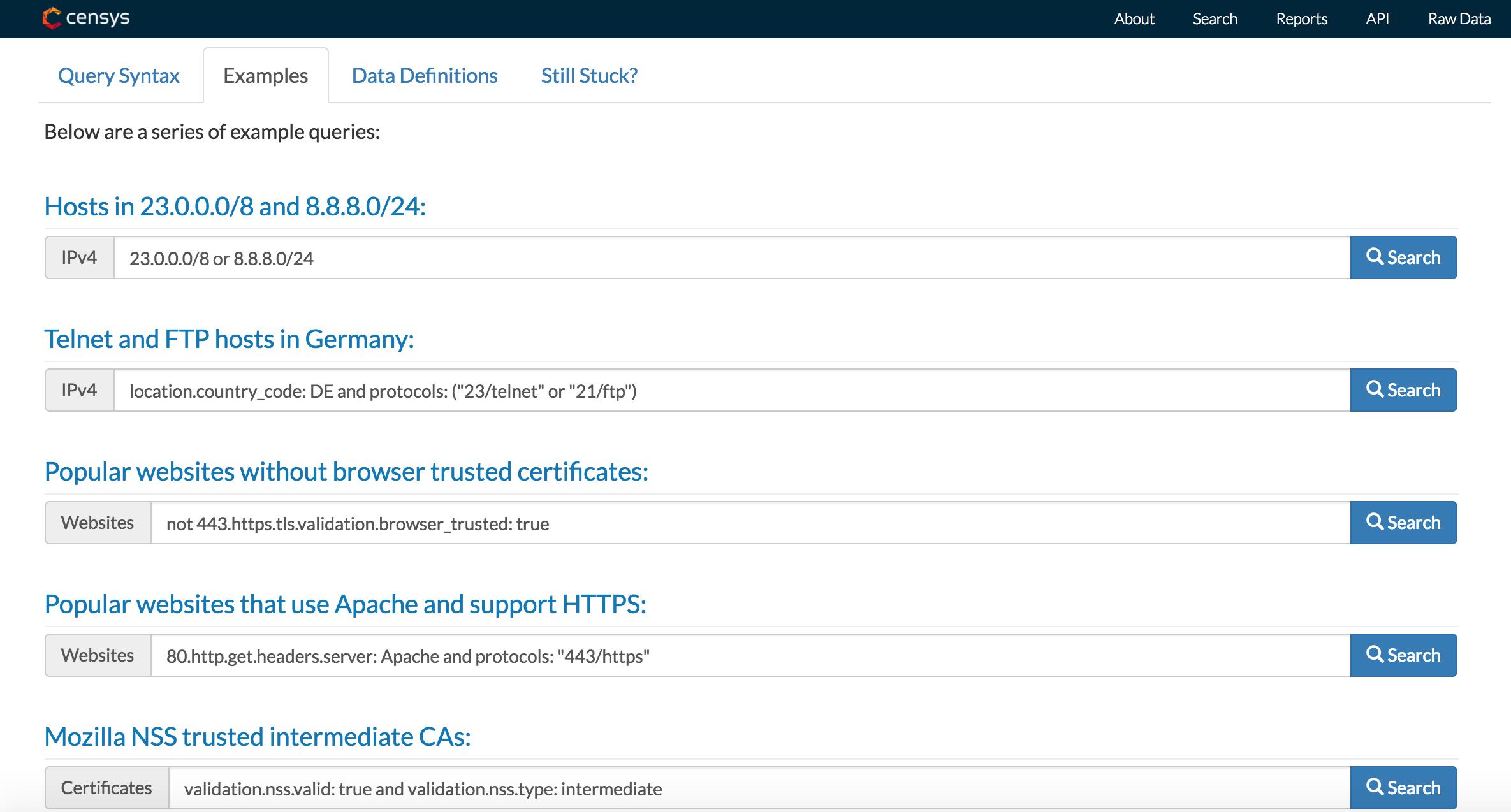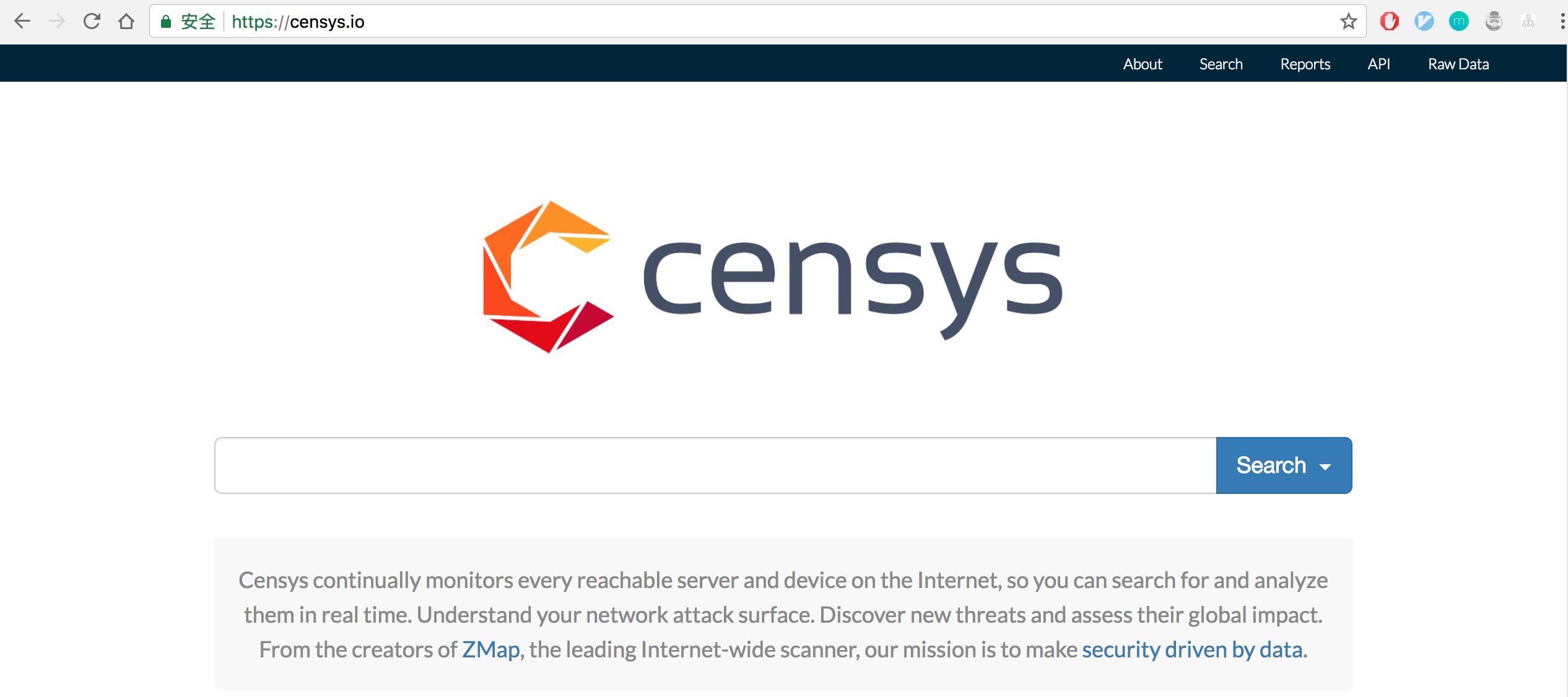Censys
Posted
tags:
篇首语:本文由小常识网(cha138.com)小编为大家整理,主要介绍了Censys相关的知识,希望对你有一定的参考价值。
Censys
Censys持续监控互联网上所有可访问的服务器和设备,以便您可以实时搜索和分析它们,了解你的网络攻击面,发现新的威胁并评估其全球影响。从互联网领先的扫描仪ZMap的创造者来说,我们的使命是通过数据驱动安全。
Censys跟国外的Shodan和国内的ZoomEye类似,可以搜索世界范围内的联网设备。Shodan和ZoomEye是个人用的比较多的两款,当然国内还有傻蛋和fofa, 国外也有其他类似的搜索引擎,这里就不一一列举了。
Censys与Shodan相比是一款免费搜索引擎,当然也有一定的限制(速度和搜索结果),而新改版后的ZoomEye对国内的搜索结果做了处理,几乎没有什么价值,对于非天朝的搜索还是可以适用的,如果对这两款搜索引擎感兴趣的朋友可以去试用一下,博客中也有关于这两款搜索引擎介绍,可自行查找。
先来膜拜一下发表在信息安全顶会CCS\'15 : A Search Engine Backed by Internet-Wide Scanning 。
Censys提供6种API的使用方式,如下:

不过这里我们仅介绍第一种的使用,即获取搜索条件下的ip地址,这个也是我们用的最多的。
使用说明
当然在使用之前也是需要注册一个账号的,因为在使用API时需要提供API Credentials即你的ID和Secret,可以在个人信息中看到。

最下面是使用的速度限制,我们可以在程序中设置一个延时,比如每查询一次睡眠三秒钟,总体来说,速度还是比较可观的。
官方示例

初看确实感觉搜索语法好像略微繁琐,没有Shodan和ZoomEye那么简练,而且文档也不够,怎么说呢,简单明了吧。不信你点开看看
查询语法
Search 的Data Parameters 主要有四个,分别是
- query:查询语句
- page:查询页
- fields:查询的结果域(可选)
- flatten:平整的结果(可选)
Example: { "query":"80.http.get.headers.server: Apache", "page":1, "fields":["ip", "location.country", "autonomous_system.asn"], "flatten":true }
好了,说明部分差不多到这里了,下面给出一个完整的示例。
示例
一般来说我们在查询的时候,会加上一定的限制条件,比如天朝的某些设备,如:"query": "weblogic and location.country_code: CN"。
#!/usr/bin/env python # -*- coding:utf-8 -*- import sys import json import requests import time API_URL = "https://www.censys.io/api/v1" UID = "aa7c1f3a-b6ab-497d-9788-5e9e4898a655" SECRET = "pay3u4ytGjbdZGftJ8ow50E8hBQVLk7j" page = 1 PAGES = 50 # the pages you want to fetch def getIp(query, page): \'\'\' Return ips and total amount when doing query \'\'\' iplist = [] data = { "query": query, "page": page, "fields": ["ip", "protocols", "location.country"] } try: res = requests.post(API_URL + "/search/ipv4", data=json.dumps(data), auth=(UID, SECRET)) except: pass try: results = res.json() except: pass if res.status_code != 200: print("error occurred: %s" % results["error"]) sys.exit(1) # total query result iplist.append("Total_count:%s" % (results["metadata"]["count"])) # add result in some specific form for result in results["results"]: for i in result["protocols"]: # iplist.append(result["ip"] + \':\' + i + \' in \' + result["location.country"][0]) iplist.append(result["ip"] + \':\' + i) # return ips and total count return iplist, results["metadata"]["count"] if __name__ == \'__main__\': query = input(\'please input query string : \') print(\'---\', query, \'---\') ips, num = getIp(query=query, page=page) print("Total_count:%s" % num) dst = input(\'please input file name to save data (censys.txt default) : \') # 保存数据到文件 if dst: dst = dst + \'.txt\' else: dst = \'censys.txt\' # get result and save to file page by page with open(dst, \'a\') as f: while page <= PAGES: print(\'page :\' + str(page)) iplist, num = (getIp(query=query, page=page)) page += 1 for i in iplist: print i[:i.find(\'/\')] for i in iplist: f.write(i[:i.find(\'/\')] + \'\\n\') time.sleep(3) print(\'Finished. data saved to file\', dst)
Sample:
starnight:censys starnight$ python script.py please input query string : "weblogic" (\'---\', \'weblogic\', \'---\') Total_count:11836 please input file name to save data (censys.txt default) : "weblogic" page :1 Total_count:1183 46.244.104.198:80 46.244.104.198:8080 31.134.202.10:2323 31.134.202.10:80 31.134.202.10:8080 31.134.203.85:2323 31.134.203.85:80 31.134.203.85:8080 31.134.205.92:2323 31.134.205.92:80 31.134.205.92:8080 31.134.206.202:2323 31.134.206.202:80 31.134.206.202:8080 31.134.201.249:80 31.134.201.249:8080 31.134.202.233:80 31.134.202.233:8080 31.134.200.94:80 31.134.200.94:8080 31.134.201.248:80 31.134.201.248:8080 31.134.200.6:80 31.134.200.6:8080 46.244.105.216:80 46.244.105.216:8080 31.134.206.131:80 31.134.206.131:2323 31.134.206.131:8080 31.134.204.127:80 31.134.204.127:8080 46.244.10.173:80 46.244.10.173:23 46.244.10.173:8080 31.134.202.82:80 31.134.202.82:8080 46.244.105.252:80 46.244.105.252:2323 46.244.105.252:8080 31.134.205.186:2323 31.134.205.186:80 31.134.205.186:8080 31.134.204.223:80 31.134.204.223:8080 31.134.207.182:2323 31.134.207.182:80 31.134.207.182:8080
好像结果不是很准确 ~ 哈哈 ~ 另外,个人可以对返回iplist做相应的改变以方便自己使用 ~
今天上午收到一封邮件,说Censys的商业版本要出来了 ~ 敬请期待 (2017.11.14)

最后,Github地址: censys
References
以上是关于Censys的主要内容,如果未能解决你的问题,请参考以下文章
